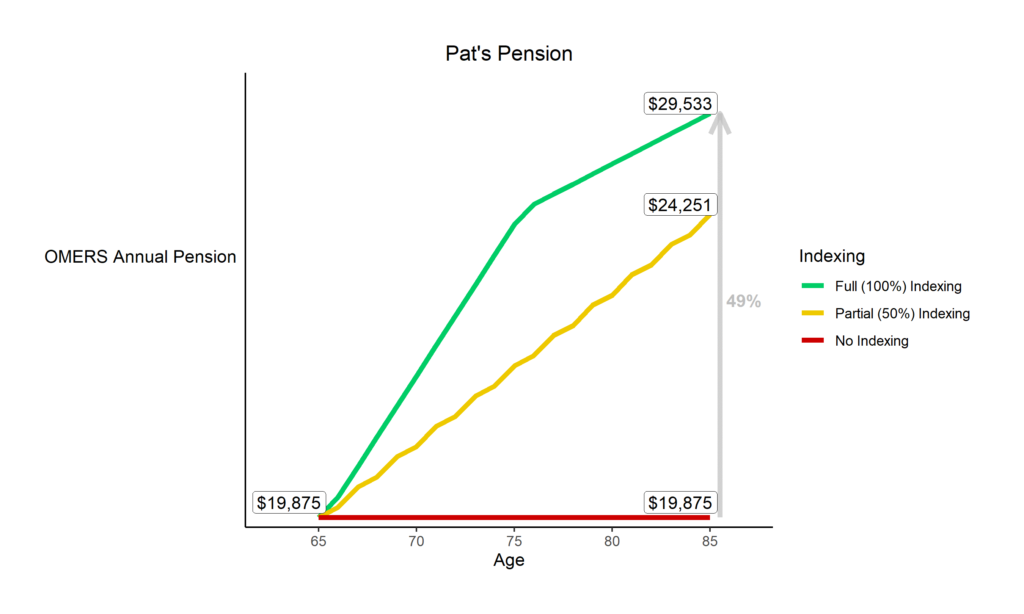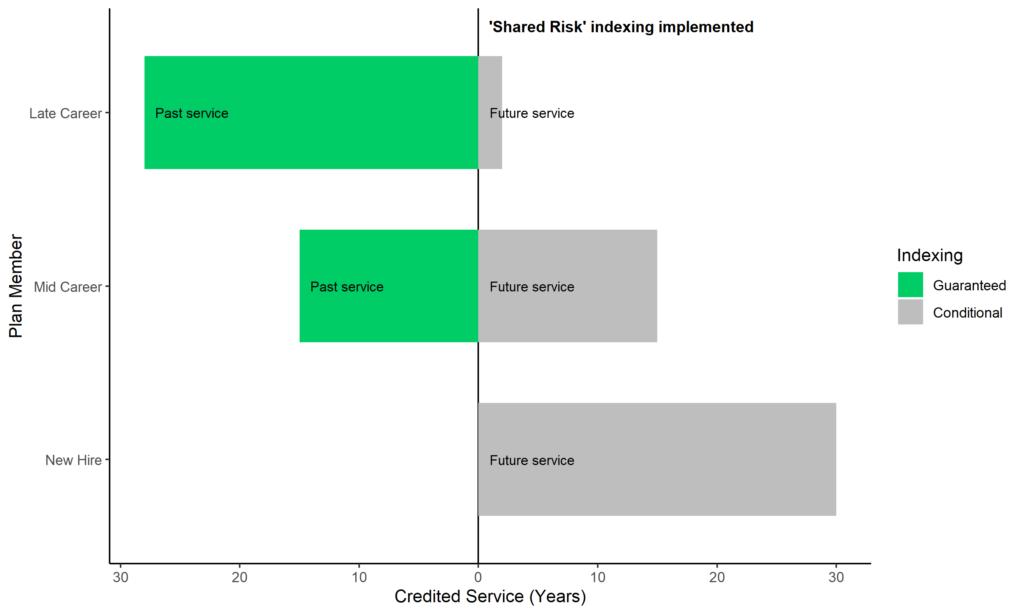Indexing is an annual increase to the pension you receive in retirement. Indexing protects your pension from inflation. It ensures your pension is not eaten away by the ongoing increases in the cost-of-living (e.g. increases in costs of food, housing, etc).
What are the current OMERS rules for indexing?
OMERS guarantees that your pension will be fully indexed every year; a promise OMERS has made since 1992. Every year, your pension is increased by an amount equal to 100% of the increase in the Consumer Price Index (CPI). For example, last year the price of goods and services went up by 1.89%, so OMERS pensions increased by 1.89% as of January 1, 2020. This ensures that your OMERS pension can buy as much this year as you could last year. Indexing is subject to a maximum annual increase of 6%.
Guaranteed indexing is an incredibly valuable part of your OMERS defined benefit pension. It accounts for nearly 20% of the cost of pensions earned by members each year.
Over 20 years of retirement, guaranteed indexing at 100% of CPI means a nearly 50% increase in the dollar amount of your pension benefit.
Take Pat, for example. After a 30-year career as a Payroll Clerk, Pat retires with 30 years of credited service. Her average “best 5” earnings is $50,000, meaning Pat’s OMERS annual pension at retirement is $19,875 (1.325% x 30 x 50,000). Let’s assume the annual increase in CPI is 2%. With guaranteed full 100% indexing, after 20 years of retirement, Pat’s pension will have increased by 49% to $29,533/year.
What is “Shared Risk” indexing” that OMERS is proposing?
“Shared Risk” indexing is OMERS’ latest brand name for conditional indexing. This proposal would end the guarantee that your pension will be indexed. It would mean that for all pensions earned after December 31, 2022, annual indexing could be reduced (i.e. to less than 100% of CPI) or eliminated entirely. For service after this date, it will be impossible for Plan member to know when or if you will receive indexing in retirement, a significant loss of pension security.
Haven’t we rejected conditional indexing before?
Yes. This is the 3rd time in 4 years that CUPE Ontario, OPSEU and other Plan members have campaigned to stop the OMERS Sponsor Board from adopting conditional indexing.
OMERS management crafted a proposal for conditional indexing in 2017, which they called “Modified Inflation Indexing” (MI²). OMERS eventually dropped the proposal in response to vocal opposition from Plan Member and most worker-side Sponsor Organizations.
The OMERS Sponsor Board considered conditional indexing again in 2018 but it did not have the support of two-thirds of Board Members to adopt the proposal. CUPE Ontario, CUPE 79/416, OPSEU, Police Association of Ontario, Ontario Professional Fire Fighters Association and the OMERS Retirees Group stood together to defeat conditional indexing.
If “Shared Risk” indexing is passed, who will decide if our indexing will be reduced or eliminated?
If this proposal is passed, indexing will no longer be guaranteed and instead will be left to the OMERS Sponsor Corporation Board of Directors to decide, based on a recommendation from OMERS Management. They could decide to provide full, reduced or no indexing. The Board is made up of 50% Worker Representatives and 50% Employer Representatives. Any decision on indexing would require support from two-thirds of Board Representatives. Meaning, a two-thirds vote would be required to first cut indexing and a second two-thirds vote (with Employer support) could be necessary to restore indexing to full levels.
Are there specific rules or conditions the Board of Directors must follow in making decisions about our indexing?
There are no specific binding rules that the OMERS Sponsor Corporation Board of Directors must follow in deciding to reduce, eliminate or restore your indexing. There is a non-binding guideline, which they call the “Funding Management Strategy”, but it is not mandatory for the Board to follow and can be disregarded. OMERS has not provided the full details of the Funding Management Strategy to Sponsor Organizations or Plan Members.
At what point would our indexing be reduced or eliminated?
There are no binding rules that the Board of Directors must follow. According to the draft non-binding Funding Management Strategy, indexing would be potentially cut when OMERS is less than 100% funded.
Today, OMERS is 97% funded.
At what point would indexing be fully restored (to 100% of CPI)?
Again, there are no binding rules that the Board of Directors must follow. According to their draft guidelines, indexing would only begin to be partially restored to future retirees on a go-forward basis if OMERS is above 105% funded. Indexing wouldn’t be fully restored on a go-forward basis unless OMERS is above 110% funded.
Catch-up, for years in which indexing was not delivered, wouldn’t be restored until OMERS is above 110% funded and only if doing so wouldn’t cause the Plan to drop below 110% funded. Meaning, if indexing is cut, members will not be made whole for your lost indexing until the Plan is well above 110% funded.
All of these restorations would require two-thirds support from the Board of Directors, including at least 3 votes from the Employer Representatives.
If indexing were to be reduced or eliminated, would it only be for one year?
There is no mechanism in the proposed “Shared Risk” indexing model requiring reduced or eliminated indexing to be only a temporary measure. A permanent cut to your pension indexing in retirement is a possibility if this proposal is passed. If the OMERS Sponsor Board decides to cut indexing, it would remain cut until the Board decides otherwise – by a two-thirds vote.
For greater clarity, if the Board decides to cut indexing for 2023, indexing would not automatically be restored to the its full level of 100% of CPI for 2024. The cut would remain until the Board is able to achieve two-thirds support of its Employer and Worker representatives to reinstate full indexing.
Under “Shared Risk” indexing, what is OMERS commitment to providing our full indexing (100% of CPI)?
There is no commitment to ensure full indexing is granted if this proposal is passed. If OMERS intended to actually deliver full indexing to Plan members, they would structure the Plan’s funding such that the default would be to provide full indexing. Instead, with this proposal, if the Board decides to cut indexing, OMERS will only fund your indexing benefit to that reduced level. This means that the “Shared Risk” proposal would not only remove the guarantee of indexing, it would also remove the funding of full indexing at 100% of CPI. Underfunding indexing in this way significantly decreases the likelihood that full indexing will be provided in the future.
What is the probability of full indexing (100% of CPI) being granted over the short, medium, and long term under this proposal?
OMERS Management has confirmed that they have done these projections, but they refuse to share this information with Plan members or Sponsor Organizations like CUPE Ontario.
If full indexing is not expected to be granted throughout the short, medium and long term, what level of indexing can we expect under this proposal?
OMERS has confirmed that the Board has done this modeling but refuses to share this information with Plan members or Sponsor Organizations like CUPE Ontario.
Do Employers share any risk in “Shared Risk” indexing?
No, Employers do not share risk in the misleadingly named “Shared Risk” indexing proposal. Rather than risk being shared equally between Employers and Plan Members, this proposal shifts Employer pension risk to active employees and future retirees who bear the risk of cuts to their pension indexing. It is no surprise that Employer organizations like the Association of Municipalities of Ontario (AMO) support it.
Would “Shared Risk” indexing affect retirees?
This proposal would not affect current retirees but would absolutely affect future retirees if the OMERS Sponsor Board decided to reduce or eliminate indexing.
Credited service earned by active Plan Members after December 31, 2022 would have conditional indexing in retirement, which would be subject to a potential cut.
To illustrate the impact of “Shared Risk” indexing, here are three Plan Members:
Late-Career Member
Start: 1995
Retire: 2025
•28 years of credited service with guaranteed indexing
•2 years of credited service with conditional indexing
Mid-Career Member
Start: 2008
Retire: 2038
•15 years of credited service with guaranteed indexation
•15 years of credited service with non-guaranteed indexation
New Hire Member
Start: 2023
Retire: 2053
•0 years of credited service with guaranteed indexation
•30 years of credited service with non-guaranteed indexation
Who is on the OMERS SC Board of Directors?
Employer Representatives
Barry Brown (Co-Chair), appointed by Association of Municipalities Ontario (AMO). Retired Hicks Morley lawyer.
Frederick Biro, appointed by the Ontario Association of Police Services Boards. Former Executive Director of the Peel Police Services Board.
Peter Derochie, appointed by the Ontario Catholic School Trustees’ Association. Executive Director of Council of Ontario Senior Business Officials and former Associate Director of Education for Simcoe Muskoka Catholic District School Board.
Marianne Love, appointed by AMO. Principal at ML Consulting.
Charlie Macaluso, appointed by the Electricity Distributors Association. CEO of MEARIE Group and former President/CEO of the EDA.
Mary McConville, appointed by the Ontario Association of Children’s Aid Societies. Former Executive Director of the Catholic Children’s Aid Society of Toronto.
Joe Pennachetti, appointed by the City of Toronto. Former City Manager at the City of Toronto.
Worker Representatives
Paul Bailey, appointed by OMERS Retiree Group. President of Police Pensioners Association of Ontario.
Frank Ramagnano (Co-Chair), appointed by Ontario Professional Fire Fighters Association. President of the Toronto Professional Fire Fighters’ Association.
Dan Axford, appointed by Police Association of Ontario (PAO). Retired police officer and past President of the PAO.
Jason Chan, appointed by CUPE 79/416. First Vice-President of CUPE Local 79.
Giulia Volpe, appointed by OPSEU. Benefits Officer with OPSEU.
Sandra Sahli, appointed by OSSTF. Retired Child and Youth Worker and former Bargaining Unit President and Chief Negotiator for OSSTF District 9 Educational Support Staff Bargaining Unit in Windsor.
John Weatherup, appointed by CUPE. President of CUPE Local 4400.
Is this happening because of COVID-19?
No, but the COVID-19 crisis should postpone the vote on this proposal.
This is the third time in four years that OMERS has tried to eliminate your guaranteed indexing. The proposal for “Shared Risk” indexing was crafted in fall 2019 and has been sitting with the Board ever since. Despite urging from thousands of Plan members who are on the front lines of this crisis and unable to fully engage on this proposal, OMERS has decided not to postpone the June vote on “Shared Risk” indexing.
OMERS was in a strong financial position heading into 2020. The Plan had a net return of 11.9% in 2019, which translates to $11.5 billion – OMERS best profitability. In a recent message addressing COVID-19, the OMERS President stated “Your OMERS pension is built for the long run” and “I am fully confident that we will find our way through this cycle”.
Share on Social Media:






